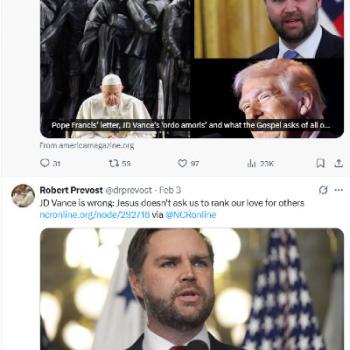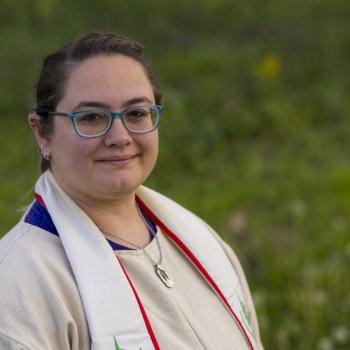As we think of [Jesus] we can achieve the difficult and unnatural: we can love those that hate us, give good for evil, and blessing for cursing (Matt. 5:44), remembering that we are not to dwell on the evil in men, but look to the image of God in them. This image covers and obliterates their faults, and by its beauty and dignity draws us to love and embrace them. ~ John Calvin, The Institutes of Christian Religion 3.7.6.
As I watched the celebration growing outside the White House's North Lawn late Sunday night when President Barack Obama announced to the nation and the world that Osama bin Laden—allegedly the world's most notorious mass-murderer and the mastermind behind the 9/11 attacks in 2001 and the 7/7 bombings in London in 2005—had been shot and killed by American Special Forces, I was seized by twin impulses. I felt, simultaneously, relieved and grieved.
I know where the relief comes from, and believe me, I do feel it. Bin Laden is the one man most responsible for changing our American way of life—for the loss of our civil liberties, for the changes in airport security that are at best inconvenient, and at worst, offensive, for the deployment of American men and women around the world who fight, are wounded, and are killed on our behalf. I have felt fear because of Osama bin Laden—fear for my own personal safety, and fear for the nations I love, my own United States, and Great Britain, my sometime home.
As we've said here before, fear causes us to make different decisions than hope. I know, rationally, that my emotions betray my faith when I allow my anger and fear to drive my conduct. I also know that I am, as our crusty old friend Calvin reminds us, commanded to love all, commanded by Jesus, no less, to love my enemies and pray for those who persecute me.
I know it, and like many folks, I find it very difficult to do.
A man was killed—an evil man, as I reckon such things—and that feels just and right, yet my faith tells me I should not celebrate this.
So I watched the celebrating youth outside the White House, and I read blog posts and my Facebook feed, and I discovered that there are myriad reactions out there to this event, that Christians most definitely are not of one mind about how to respond. From celebration to mourning, we are all over the map.
As we try to do each week at "Faithful Citizenship," I want to peel back the layers of the onion and do theological reflection so we can understand where such diverse responses come from. And as usual, our reflection will lead us to wrestle with the commands we're given by our Savior and through our tradition.
As President Obama addressed the nation Sunday night, I knew before he reached the podium out of which Christian theological tradition he was speaking. Mr. Obama has claimed Reinhold Niebuhr as his favorite theologian (sometimes he calls him a favorite philosopher, because that's less scary—who reads theologians?), and in his acceptance speech for the Nobel Peace Prize, he channeled Niebuhr in speaking of ways that the presence of evil in the world sometimes requires a violent response in the name of justice and, ironically, peace:
We must begin by acknowledging the hard truth that we will not eradicate violent conflict in our lifetimes. There will be times when nations—acting individually or in concert—will find the use of force not only necessary but morally justified.
I make this statement mindful of what Martin Luther King said in this same ceremony years ago—"Violence never brings permanent peace. It solves no social problem: it merely creates new and more complicated ones." As someone who stands here as a direct consequence of Dr. King's life's work, I am living testimony to the moral force of non-violence. I know there is nothing weak --nothing passive—nothing naïve—in the creed and lives of Gandhi and King.
But as a head of state sworn to protect and defend my nation, I cannot be guided by their examples alone. I face the world as it is, and cannot stand idle in the face of threats to the American people. For make no mistake: evil does exist in the world. A non-violent movement could not have halted Hitler's armies. Negotiations cannot convince al Qaeda's leaders to lay down their arms. To say that force is sometimes necessary is not a call to cynicism—it is a recognition of history; the imperfections of man and the limits of reason.
I believe Barack Obama is a good man and a Christian. Although I believe I am personally commanded by Jesus' words and pacifistic example to avoid violence and to turn the other cheek, I have said on many occasions that if my family or any of those I love are threatened, I will fight and die to protect them, and President Obama said in Oslo—and said again Sunday night—that we must sometimes do things which we would rather not in order to safeguard those we love and the things we cherish.





